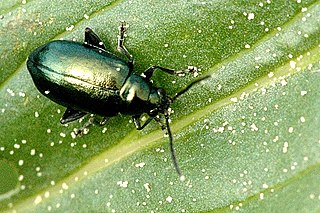 W
WAltica lythri is a species of flea beetle from the leaf beetle family, that is common in Asia, Europe, and North Africa, including Israel. The beetles size is 5 mm (0.20 in), and their colour is blue with black and green. They present an ovipositor during oviposition. The species is distributed in European countries such as Finland and Ukraine, to the Asian countries of Azerbaijan, Dagestan, and Turkey. The species hibernate in winter, and come aground during summer months, when they are hungry. They feed on leaves of willowherb, water primroses and sallows. The species could become victims of such predators as Braconidae, Ichneumonidae, and adults of Pentatomidae, especially Zicrona caerulea.
 W
WAnthonomus haematopus is a species of true weevil in the beetle family Curculionidae. It is found in North America.
 W
WAnthonomus tenebrosus is a flowerbud weevil native to South America.
 W
WThe Anthrenocerus australis is a species of beetle belonging to the dermestidae family. It is commonly known as the Australian Carpet Beetle and is one of the most researched of the thirty-one species in the Anthrenocerus genus. This is generally attributed to its prevalence throughout Australia and New Zealand and the negative economic and agricultural impact it has as a pest. It is the larvae that causes damage to products, not the adult beetle. The total life cycle of this insect is around three years, most of which is spent as a larva. Once the beetle reaches maturity, it only lives for between two and six weeks.
 W
WAspidoglossa subangulata is a species of ground beetle in the subfamily Scaritinae. It was described by Chaudoir in 1843.
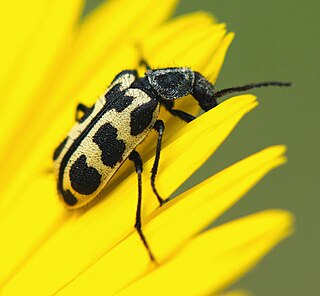 W
WAstylus atromaculatus is a species of beetle in the family Melyridae. It is variously known as the spotted maize beetle, or pollen beetle. It is indigenous to Argentina and neighbouring countries, but has been accidentally imported into various other regions such as the warmer regions of North America and much of Africa, where it has become invasive.
 W
WBarypeithes sulcifrons is a species of weevil native to Europe.
 W
WBembidion planum is a species of ground beetle in the family Carabidae. It is found in North America.
 W
WBembidion semistriatum is a species of ground beetle in the family Carabidae. It is found in North America.
 W
WThe boll weevil is a beetle that feeds on cotton buds and flowers. Thought to be native to Central Mexico, it migrated into the United States from Mexico in the late 19th century and had infested all U.S. cotton-growing areas by the 1920s, devastating the industry and the people working in the American South. During the late 20th century, it became a serious pest in South America as well. Since 1978, the Boll Weevil Eradication Program in the U.S. allowed full-scale cultivation to resume in many regions.
 W
WBuprestis langii is a species of metallic wood-boring beetles in the family Buprestidae. It is found in North America.
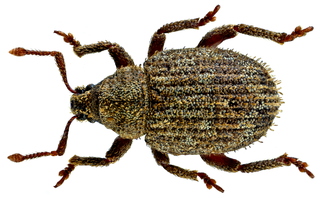 W
WCaenopsis waltoni is a species of weevil native to Europe.
 W
WCalosoma affine is a species of ground beetle in the subfamily of Carabinae. It was described by Chaudoir in 1843.
 W
WCantharis figurata is a species of soldier beetles native to Europe.
 W
WCantharolethrus luxerii is a species of stag beetle.
 W
WCarpophilus melanopterus is a species of sap-feeding beetles in the family Nitidulidae. It is found in Central America and North America.
 W
WCarpophilus mutilatus, known generally as the confused sap beetle or flower beetle, is a species of sap-feeding beetle in the family Nitidulidae. It is found in Oceania, Europe, North America, and temperate Asia.
 W
WCarpophilus obsoletus is a species of sap-feeding beetle in the family Nitidulidae. It is found in Africa, Europe & Northern Asia, North America, and Southern Asia.
 W
WCatoxantha purpurea is a species of jewel beetles belonging to the family Buprestidae, subfamily Chrysochroinae.
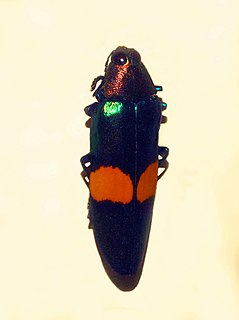 W
WChrysochroa edwardsii is a Jewel Beetle or Metallic Wood-boring Beetle of the Buprestidae family.
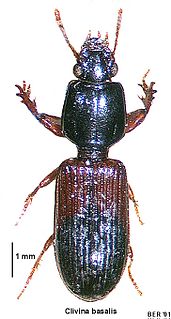 W
WClivina basalis is a species of ground beetle in the subfamily Scaritinae. It was described by Chaudoir in 1843.
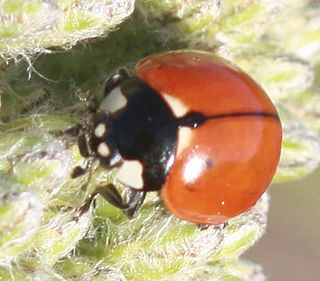 W
WCoccinella californica is a ladybird beetle found in California commonly known as the California lady beetle.
 W
WCoccinella magnifica, also known as the scarce seven-spot ladybird, is a species of beetle in the family Coccinellidae. Both the adults and larvae are predators. They are known for their diet of aphids, but will eat many other pests such as soft-scale insects, spider mites, mealybugs, and the eggs of many others. A single larvae will eat about 400 medium size aphids during its development to pupal stage. An adult will eat about 300 aphids before it lays its eggs. Approximately 3 to 10 aphids are eaten for each egg laid, and a female will lay from 50 to 300 eggs in her lifetime. More than 5000 aphids may be eaten by a single adult ladybug in its lifetime. The scarce 7-spot is often found along with nests of wood ants.
 W
WCryptarcha ampla is a species of sap-feeding beetle in the family Nitidulidae. It is found in North America.
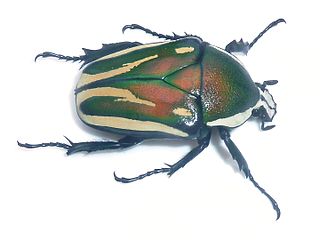 W
WDicronorhina derbyana is a sub-Saharan species of flower chafer.
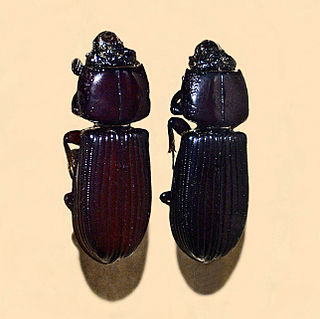 W
WDidimus parastictus is a species of beetles of the family Passalidae.
 W
WDynastes hyllus is a large scarab beetle species that ranges from Mexico to Guatemala. Its larvae have been found to associate with the logs of Persea americana.
 W
WEnoclerus eximius is a species of checkered beetle in the family Cleridae. It is found in North America.
 W
WEpicauta puncticollis, the punctate blister beetle, is a species of blister beetle in the family Meloidae. It is found in Central America and North America.
 W
WEpuraea luteola, the pineapple sap beetle, is a species of sap-feeding beetle in the family Nitidulidae. It is found in North America, Oceania, and Europe.
 W
WGlenea multiguttata is a species of beetle in the family Cerambycidae. It was described by Félix Édouard Guérin-Méneville in 1843, originally under the genus Saperda. It is known from India. It feeds on Mangifera indica.
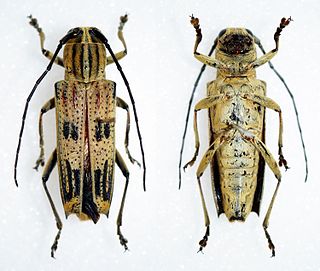 W
WGlenea quadrinotata is a species of beetle in the family Cerambycidae. It was described by Félix Édouard Guérin-Méneville in 1843. It is known from Myanmar, Malaysia, Laos, India, and Thailand.
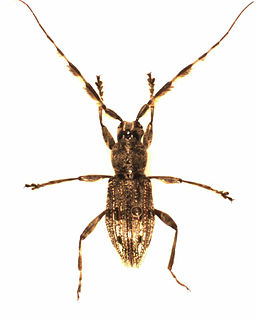 W
WHexatricha pulverulenta, commonly known as the squeaking longhorn, is a beetle in the family Cerambycidae, the only species in the monotypic genus Hexatricha. It is endemic to New Zealand. It was first described by John O. Westwood in 1843 as Lamia pulverulenta, and later moved into the genus Hexatricha.
 W
WHoloparamecus caularum is a species of handsome fungus beetle in the family Endomychidae. It is found in Europe & Northern Asia and North America.
 W
WThe huhu beetle is a longhorn beetle endemic to New Zealand. It is the heaviest beetle found in New Zealand.
 W
WLachnophorus elegantulus is a species of ground beetle in the family Carabidae. It is found in North America.
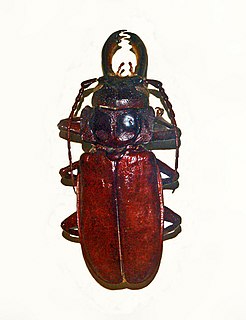 W
WMallodon downesi is a species of beetle belonging to the family Cerambycidae.
 W
WMallosia graeca is a species of beetle in the subfamily Lamiinae, found only in Greece. The species is 13–30 mm long, and brown coloured.
 W
WNicrophorus nigrita is a burying beetle described by Mannerheim in 1843.
 W
WOdontolabis delesserti is a quite rare species of beetles of the family Lucanidae.
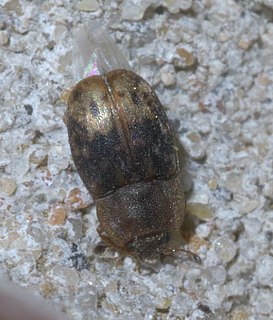 W
WOmosita is a genus of sap beetles, erected by Wilhelm Ferdinand Erichson in 1843.
 W
WOrnithia mexicana is a species of beetle in the family Cerambycidae. It is the only species of the genus Ornithia . It was described by Sturm in 1843.
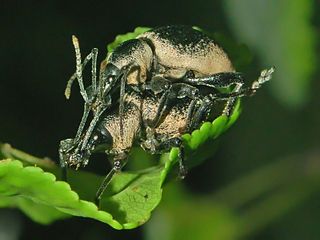 W
WOtiorhynchus vehemens is a species of broad-nosed weevils belonging to the family Curculionidae, subfamily Entiminae.
 W
WPlatynus ovipennis is a species of ground beetle in the family Carabidae.
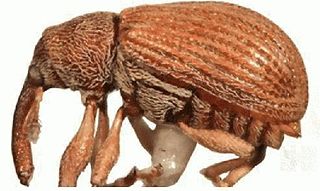 W
WPseudanthonomus helvolus is a species of true weevil in the beetle family Curculionidae. It is found in North America.
 W
WPterostichus lama is a species of woodland ground beetle in the family Carabidae. It is found in North America.
 W
WPyrophorus punctatissimus is a species of click beetle.
 W
WSacodes pulchella, the beautiful marsh beetle, is a species of marsh beetle in the family Scirtidae. It is found in North America.
 W
WSacodes thoracica is a species of marsh beetle in the family Scirtidae. It is found in North America.
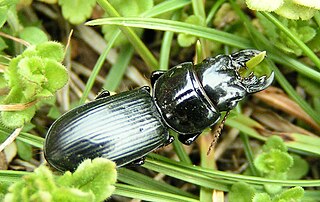 W
WScarites vicinus is a species of ground beetle in the family Carabidae.
 W
WSchizogenius amphibius is a species of ground beetle in the family Carabidae. It is found in North America.
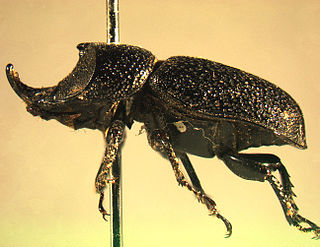 W
WSinodendron rugosum is a species of the family Lucanidae, the stag beetles. It is commonly referred to as the rugose stag beetle, and is the only known member of the genus Sinodendron to occur in western North America.
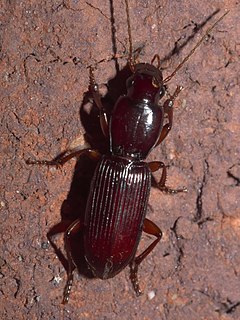 W
WStenomorphus californicus is a species of ground beetle in the family Carabidae. It is found in North America.
 W
WSternotomis amabilis is a species of beetle in the family Cerambycidae. It was described by Frederick William Hope in 1843. It contains the varietas Sternotomis amabilis var. submaculata.
 W
WTecnophilus croceicollis is a species of ground beetle in the family Carabidae. It is found in Central America and North America.
 W
WTetragonoderus fasciatus is a species of beetle in the family Carabidae. It was described by Haldeman in 1843.
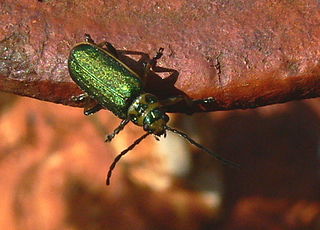 W
WTrirhabda flavolimbata is a species of skeletonizing leaf beetle in the family Chrysomelidae. It is found in North America.